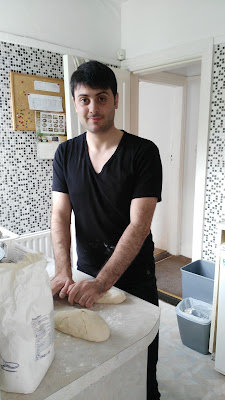In the past year or so I've tried to embrace better habits. A huge part of that has been learning what makes me happier, what makes me not-happy (sad, stressed out, anxious), what motivates me, and how I best interact with others. Central to this is understanding that fostering good habits leads to a happier self. One of my bad habits is definitely my over-reliance on my smartphone.
[My Christmas didn't look like this, it was really nice, but here's a helpful article: http://psychcentral.com/blog/archives/2015/12/15/resisting-reaching-for-the-smartphone-temptation-this-holiday-season/]
Ironically, my PhD is involved in directly challenging the individualised and individual-centric nature of our society. I argue on a regular basis that it is the political and economic determinants of the social structures we operate within that really have a lasting and often damaging impact upon our health, and not our individual practices. At the time same time I've found myself being drawn to strands of medicine, healing, health practices and philosophy that place our habits and practices at the centre of their modus operandi. I've found them incredibly useful, life-changing even.
To be honest, I've found that these modes of thinking don't really contradict my political and intellectual beliefs, but reinforce them. For example, there is no doubt that for most individuals, late-(or post- or whatever we're calling it these days) capitalism is an overwhelmingly negative thing, feeding us the idea that consumer culture and cheap airfare can compensate for insecure work, fragmented family lives and disrupted lifecourses. Having an ideological standpoint about how to oppose this process helps in some way, particularly if we surround ourselves with a confirmation-bias bubble of those who believe the same as we do.
But at the same time, I've actually found this has made me more unhappy rather than more able to challenge the system I find myself wrapped up in. 'The left' is an angry and disillusioned place in many ways, and I've found more often than not I agree on certain issues but disagree on even more (there's more than one way to skin a cat, and I probably have less in common with conventional male 'Marxists' than I would ever have imagined a few years ago) and that leads to further feelings of isolation, when the people you're supposed to be on-side with are actually coming from a very different set of experiences, and seem unreflexive about this.
So, I've found that being introspective is one way of dealing with this and with all the negative feelings that can stem from it. That's very much in keeping with the idea of 'insulating' the self, of doing what you can to mediate your relationship with external factors you have very little control over to ensure the extent to which they can pollute your health and wellbeing is limited. In a lot of ways, that's a very neoliberal thought.
Unfortunately, there's one element of my life that feels like it is often outside of my control. That is, the little terror in my pocket-the smartphone. It got especially stressful in the run-up to Christmas, trying to negotiate who wanted to bring what to Christmas lunch, and planning the timing of lots of different lives coming together from a smartphone screen.
I'd love to open up a dialogue where we can honestly talk about how technology makes us feel, and by that I mean the bad as well as the good. So here you go, I've made a short list of why my smartphone is bad for me.
Being always on is terrifying
When I was younger, the dial-up internet connection opened up a world of forums, of MSN, of all these different people and concepts I'd had zero exposure to before. It was life-changing. But if someone had to use the phone, and intermittently for absolutely no reason, I got disconnected. If someone else wanted to use the computer, that was it. My connection to the internet existed solely on this desktop computer, mediated by an impossibly slow dial-up modem. Now, the internet lives in my pocket. I used to find this totally overwhelming when I had apps like Facebook and Gmail send me notifications. I've since turned off every single push notification on my phone, but that doesn't stop me from sometimes having to turn off my phone or put it in flight mode so I can just listen to music without the compulsive need to check Instagram or Whatsapp. And I am convinced Facebook Messenger is the single worst thing to happen to our mental health in the past few years. That, and the double-tick on Whatsapp that lets you know when someone has read your message.
Being contactable at all times has removed the sanctity of 'hometime', 'the weekend' and taken away some of our agency
My supervisor is an absolute legend at work-life balance, and she taught me early on to take my weekends off and to not work in the evening. But there have been instances, for example when doing the admin role I had in addition to my PhD in 1st and 2nd year, when tutoring, and when planning fieldwork, conference papers etc. that its impossible to shut off, either because of the people you're working in conjunction with are slaves to their emails, or because of looming deadlines. I've found that trying to switch off at reasonable junctures is the only way to keep sane, but I can only imagine this will get harder when I am no longer only answerable to myself (i.e. employed by somebody) and when I have to juggle baby and work. Setting good habits now is how I'm saving my sanity for later. Furthermore, communicating primarily by text or instant message is incredibly stressful for me. It leads to an eternal lack of clarity, and it's so easy to spout off negative nonsense. If we could just pick up the phone and talk to the people we want to make plans with instead of the drip-drip of texts, wouldn't we all be happier?
It's bad for our sleep cycles and our eyes
I can be pretty compulsive (sure, aren't we all), so I am quite bad at checking something on my phone in the middle of the night. Although, to be honest, I've pretty much stopped doing this now. Especially when I lived between two countries, the urge to stay up late in the dark staring at a tiny screen, or replying to a message in the middle of the night, was intense. You know what's bad for our natural circadian pattern? The light from smartphones. Do you know what's bad for getting into a deep sleep? Thinking about a message, waiting for someone to reply to a message, mindlessly refreshing the Guardian website (pathetic, I know), or reading passive-aggressive forums. Just go to sleep. Sleep is good for you, makes you healthy, get enough sleep.
By way of conclusion
I actually started writing this post about two weeks ago when I was getting majorly stressed out about organising Christmas (there were 9 people for dinner in total, it was very stressful, and now I am sick). I've since then calmed down a little bit, although my basic gripes with smartphones remain. They are a great resource for travelling, living in a new place, and being flexible. Google Maps, internet banking, email and video chat can be amazing resources, when you're in control of them. But the internet has shifted a gear in the past few years, and we need to be honest with ourselves about that. It now feels, to me anyway, that social media and other online tools for enhancing our lives are actually more about shilling products, selling services, making us narcissistic and insecure, and developing and encouraging addictive tendencies. That's a topic I could talk about all day, so I'll leave it for now. I'm not sure where I'm going with this post, other than we need to start being honest with ourselves about smartphone use and how it makes us feel.
***I've been listening to this podcast called Note to Self (http://www.wnyc.org/shows/notetoself) lately and they have some really good episodes on these topics. The recent episodes 'Go Ahead, Miss Out' and 'Distracted is the New Drunk' were excellent.















































